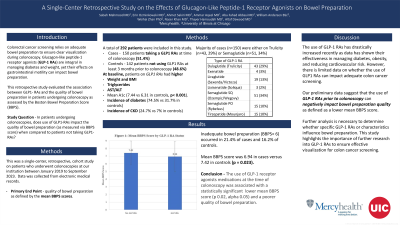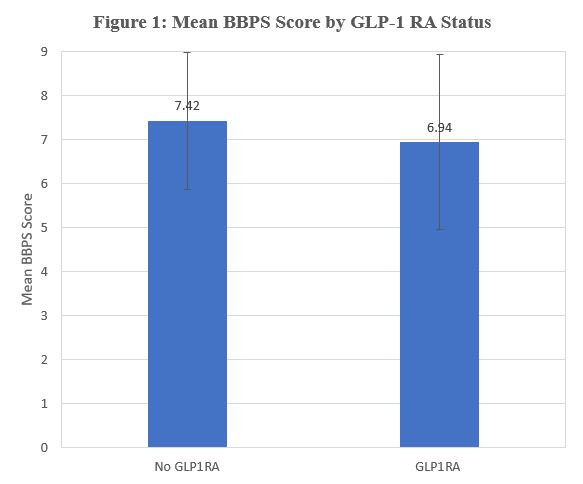Tuesday Poster Session
Category: Colorectal Cancer Prevention
P3830 - The Effect of GLP-1 Receptor Agonists on Bowel Preparation
Tuesday, October 29, 2024
10:30 AM - 4:00 PM ET
Location: Exhibit Hall E

Has Audio
- SM
Sabah Mahmood, MD
Mercy Health
Rockford, IL
Presenting Author(s)
Sabah Mahmood, MD1, Erin Ozminkowski, MD2, Ahmet Sakiri, MD1, Ammar Aqeel, MD3, Abu Fahad Abbasi, MD1, William Andersen, BSc4, Weihai Zhan, PhD5, Naser Khan, MD1, Thayer Hamoudah, MD1, Altaf Dawood, MD, MBBS1
1Mercy Health, Rockford, IL; 2Mercyhealth, Rockford, IL; 3Mercy Health, Loves Park, IL; 4University of Illinois College of Medicine, Loves Park, IL; 5UIC College of Medicine, Rockford, IL
Introduction: Colorectal cancer screening relies on adequate bowel preparation to ensure clear visualization during colonoscopy. Glucagon-like peptide-1 receptor agonists (GLP-1 RAs) are integral in managing diabetes and weight, yet their effects on gastrointestinal motility, such as delaying gastric emptying and reducing small bowel transit time, can impact bowel preparation. Current guidelines do not specifically address the interaction between GLP-1 RAs and bowel preparation. This retrospective study evaluated the association between GLP1- RAs and the quality of bowel preparation in patients undergoing colonoscopy as assessed by the Boston Bowel Preparation Score.
Methods: We performed a single-center retrospective study on patients who underwent colonoscopy at our institution between January 2019 to September 2023. We excluded patients undergoing emergent colonoscopies and those with known GI motility disease and recorded BBPS scores. We obtained data from our electronic medical records. The primary outcome was the quality of bowel preparation as defined by the total BBPS scores, with a score of 0 indicating an unprepared colon and a score of 9 indicating an optimally prepared colon. Demographic data, comorbidities, medication history, and procedural outcomes were also collected. Statistical analysis was performed using student’s t-test for continuous variables and chi square test for categorical variables.
Results: A total of 292 patients were included in this study, with 150 patients taking a GLP1 RA (51.4%) prior to colonoscopy and 142 patients not using GLP1 RAs (48.6%) at least 3 months prior to colonoscopy. At baseline, patients on GLP1 RAs had a higher mean weight, BMI, and A1c (7.44 vs 6.31 in controls, p< 0.001). Patients on GLP1 RAs had a higher incidence of diabetes (74.5% vs 31.7% in controls, p< .001) and a higher incidence of CKD (24.7% vs 7% in controls, p< .001). Inadequate bowel preparation (BBPS< 6) occurred in 21.4% of cases and 16.2% of controls. Mean BBPS score was 6.94 in cases versus 7.42 in controls (p = 0.023).
Discussion: Our preliminary data suggest that the use of GLP-1 RAs prior to colonoscopy can negatively impact bowel preparation quality as defined as a lower mean BBPS score. Further analysis is necessary to determine whether specific GLP-1 RAs or characteristics influence bowel preparation. This study highlights the importance of further research into GLP-1 RAs to ensure effective visualization for colon cancer screening.

Note: The table for this abstract can be viewed in the ePoster Gallery section of the ACG 2024 ePoster Site or in The American Journal of Gastroenterology's abstract supplement issue, both of which will be available starting October 27, 2024.
Disclosures:
Sabah Mahmood, MD1, Erin Ozminkowski, MD2, Ahmet Sakiri, MD1, Ammar Aqeel, MD3, Abu Fahad Abbasi, MD1, William Andersen, BSc4, Weihai Zhan, PhD5, Naser Khan, MD1, Thayer Hamoudah, MD1, Altaf Dawood, MD, MBBS1. P3830 - The Effect of GLP-1 Receptor Agonists on Bowel Preparation, ACG 2024 Annual Scientific Meeting Abstracts. Philadelphia, PA: American College of Gastroenterology.
1Mercy Health, Rockford, IL; 2Mercyhealth, Rockford, IL; 3Mercy Health, Loves Park, IL; 4University of Illinois College of Medicine, Loves Park, IL; 5UIC College of Medicine, Rockford, IL
Introduction: Colorectal cancer screening relies on adequate bowel preparation to ensure clear visualization during colonoscopy. Glucagon-like peptide-1 receptor agonists (GLP-1 RAs) are integral in managing diabetes and weight, yet their effects on gastrointestinal motility, such as delaying gastric emptying and reducing small bowel transit time, can impact bowel preparation. Current guidelines do not specifically address the interaction between GLP-1 RAs and bowel preparation. This retrospective study evaluated the association between GLP1- RAs and the quality of bowel preparation in patients undergoing colonoscopy as assessed by the Boston Bowel Preparation Score.
Methods: We performed a single-center retrospective study on patients who underwent colonoscopy at our institution between January 2019 to September 2023. We excluded patients undergoing emergent colonoscopies and those with known GI motility disease and recorded BBPS scores. We obtained data from our electronic medical records. The primary outcome was the quality of bowel preparation as defined by the total BBPS scores, with a score of 0 indicating an unprepared colon and a score of 9 indicating an optimally prepared colon. Demographic data, comorbidities, medication history, and procedural outcomes were also collected. Statistical analysis was performed using student’s t-test for continuous variables and chi square test for categorical variables.
Results: A total of 292 patients were included in this study, with 150 patients taking a GLP1 RA (51.4%) prior to colonoscopy and 142 patients not using GLP1 RAs (48.6%) at least 3 months prior to colonoscopy. At baseline, patients on GLP1 RAs had a higher mean weight, BMI, and A1c (7.44 vs 6.31 in controls, p< 0.001). Patients on GLP1 RAs had a higher incidence of diabetes (74.5% vs 31.7% in controls, p< .001) and a higher incidence of CKD (24.7% vs 7% in controls, p< .001). Inadequate bowel preparation (BBPS< 6) occurred in 21.4% of cases and 16.2% of controls. Mean BBPS score was 6.94 in cases versus 7.42 in controls (p = 0.023).
Discussion: Our preliminary data suggest that the use of GLP-1 RAs prior to colonoscopy can negatively impact bowel preparation quality as defined as a lower mean BBPS score. Further analysis is necessary to determine whether specific GLP-1 RAs or characteristics influence bowel preparation. This study highlights the importance of further research into GLP-1 RAs to ensure effective visualization for colon cancer screening.

Figure: Figure 1:Mean BBPS Score
Note: The table for this abstract can be viewed in the ePoster Gallery section of the ACG 2024 ePoster Site or in The American Journal of Gastroenterology's abstract supplement issue, both of which will be available starting October 27, 2024.
Disclosures:
Sabah Mahmood indicated no relevant financial relationships.
Erin Ozminkowski indicated no relevant financial relationships.
Ahmet Sakiri indicated no relevant financial relationships.
Ammar Aqeel indicated no relevant financial relationships.
Abu Fahad Abbasi indicated no relevant financial relationships.
William Andersen indicated no relevant financial relationships.
Weihai Zhan indicated no relevant financial relationships.
Naser Khan indicated no relevant financial relationships.
Thayer Hamoudah indicated no relevant financial relationships.
Altaf Dawood indicated no relevant financial relationships.
Sabah Mahmood, MD1, Erin Ozminkowski, MD2, Ahmet Sakiri, MD1, Ammar Aqeel, MD3, Abu Fahad Abbasi, MD1, William Andersen, BSc4, Weihai Zhan, PhD5, Naser Khan, MD1, Thayer Hamoudah, MD1, Altaf Dawood, MD, MBBS1. P3830 - The Effect of GLP-1 Receptor Agonists on Bowel Preparation, ACG 2024 Annual Scientific Meeting Abstracts. Philadelphia, PA: American College of Gastroenterology.
